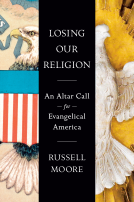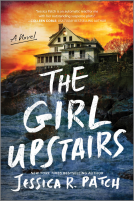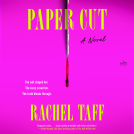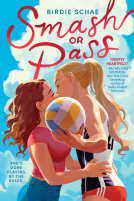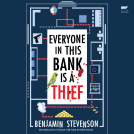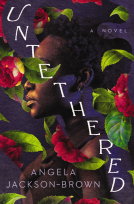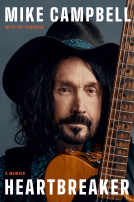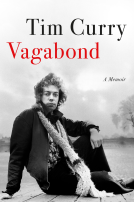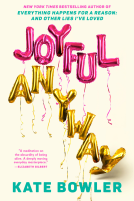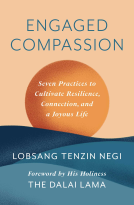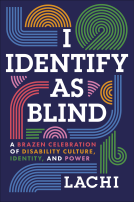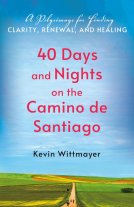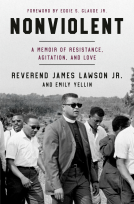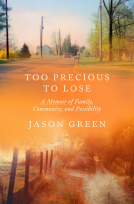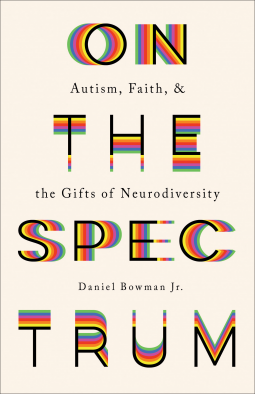
On the Spectrum
Autism, Faith, and the Gifts of Neurodiversity
by Daniel Bowman Jr.
This title was previously available on NetGalley and is now archived.
Send NetGalley books directly to your Kindle or Kindle app
1
To read on a Kindle or Kindle app, please add kindle@netgalley.com as an approved email address to receive files in your Amazon account. Click here for step-by-step instructions.
2
Also find your Kindle email address within your Amazon account, and enter it here.
Pub Date Aug 10 2021 | Archive Date Aug 31 2021
Baker Academic & Brazos Press | Brazos Press
Talking about this book? Use #OntheSpectrum #NetGalley. More hashtag tips!
Description
Nearly everyone knows someone on the autism spectrum, whether it's a niece or nephew, a student in their classroom, a coworker, or a sibling, spouse, or child. One in 54 children has autism, according to the CDC, and autism is reported across racial, ethnic, and socioeconomic groups. Yet most of what people think they know about autism is wrong.
On the Spectrum debunks myths with a realistic yet hope-filled deep dive into the heart, mind, and life of a Christian. Daniel Bowman, a novelist, poet, and professor, received an autism diagnosis at age thirty-five after experiencing crises in his personal and professional life. The diagnosis shed light on his experience in a new, life-giving way. In this captivating book, Bowman reveals new insights into autism, relationships, faith, and the gift of neurodiversity.
Rather than viewing autism as a deficiency, Bowman teaches readers--through stories of his heartbreaks and triumphs--authentic ways to love their neighbors as themselves, including their autistic neighbors who are fearfully and wonderfully, if differently, made.
Advance Praise
“On the Spectrum rings with poetry, compassion, and wisdom, and it reveals so much about autistic experience. I felt nourished by the truths that Daniel Bowman tells and relieved to see them shared. This book may surprise you, and it will certainly inform you.”—Katherine May, author of Wintering: The Power of Rest and Retreat in Difficult Times
“What a gift! Moving from mere acceptance to unabashed celebration of neurodiversity is a long-overdue and necessary shift; truly, I believe this is an invitation from the Holy Spirit. I am so grateful to Daniel Bowman Jr. for searingly and beautifully sharing his own fearfully-and-wonderfully-made story and inviting all of us to a more full, more diverse, more compelling vision of the kingdom of God.”—Sarah Bessey, author of A Rhythm of Prayer and Jesus Feminist
“Dan Bowman’s memoir is a wise pathway to loving our neighbors in a neurodivergent world, one where ‘those of us on the spectrum will always deal with loneliness and alienation.’ Using the metaphor of a plum tree growing in an inhospitable environment, and with a poet’s eye for detail, Bowman engages different modes of interacting with the world and its multifarious senses. A sense of vigilance pervades the quiet universe of language unfolding in his soul, whether in church, outdoors in a field, or within a community of artists. Bowman reminds us of the role of poetry and faith in guiding us toward God and, ultimately, in honoring the dignity of our shared humanity.”—Karen An-hwei Lee, author of The Maze of Transparencies and Phyla of Joy
“This is an illuminating, challenging, and deeply human book that we all need to read in order to truly embody solidarity with one another. We need to read stories of neurodiversity from those who embody those stories best, and Bowman’s book is a great place to start the journey.”—Kaitlin B. Curtice, author of Native
“I can only imagine how many people will read Daniel Bowman’s moving memoir and feel like someone finally sees them. His generous, vulnerable prose will surely make those on the spectrum feel less alone in the world. But for neurotypical readers like me, Bowman invites us to see our neighbors afresh, calling us to remake our worlds to welcome the art and creativity of those with autism. This book itself is one of the gifts of neurodivergence, adding to this teeming, diverse creation in which God takes delight.”—James K. A. Smith, professor, Calvin University; editor in chief of Image; author of You Are What You Love and On the Road with Saint Augustine
“With the gift of his experience as an autistic adult in the church, Dan Bowman’s exquisite vulnerability lights the path toward greater understanding, better advocacy, and a compelling vision for inclusion that moves beyond stereotypes and tokenism. As a spiritual director, a mother to an autistic child, and a Jesus follower, I have been waiting for a book like On the Spectrum. This is the book the church has desperately needed. I want to give this book to everyone I know.”—Nish Weiseth, founder and spiritual director, Formation Northwest
“Dan Bowman invites readers into another way of looking at the world, literature, and faith, through his artful and thoughtful eyes. It’s both a gift and an indictment of our world to experience how autistic people navigate a society, including the church, that is not set up for them to thrive. I hope everyone reads this book and the many others that are sure to come.”—D. L. Mayfield, author of The Myth of the American Dream: Reflections on Affluence, Autonomy, Safety, and Power
“In his remarkable meditations on autistic life, Bowman creates a living map to orient newcomers to our neurodiverse world. I cannot imagine a better guide than his generously empathic and richly detailed writing. On the Spectrum is essential reading, perhaps especially for well-meaning Christians whose limited conception of the imago Dei has failed to recognize the divine hand in neurodiversity.”—Amy Sullivan, religion journalist; author of The Party Faithful
“A deft and poetic affirmation of faith, Daniel Bowman’s new book is able to ‘honor autistic lives—breathed by the very breath of God—that often feel fragile in the exacting landscape of an allistic world.’ Bowman accomplishes this through a pondering of self: a journey through his life, his connection to story, and his search for transcendence. In mining his own experiences, Bowman creates a kenotic text: a book that shows us how to respect ‘one’s personhood, to listen, to default to humility and kindness.’”—Nick Ripatrazone, author of Wild Belief; culture editor for Image Journal
“June Jordan tells us that practicing poetry means taking control of the language of your life. With On the Spectrum, Dan Bowman exemplifies what taking up this task looks and feels like while also inviting us to bear witness, alongside him, to the minute particulars of being human. By picking up what he’s setting down, we’re enjoined in the work of dwelling more knowingly in our own existence. Receive his voice.”—David Dark, author of Life’s Too Short to Pretend You’re Not Religious
“In On the Spectrum, Daniel Bowman tells his own story with conviction—in both senses of that word: he is convicted of the importance of telling his own story himself; and he invites neurotypical readers to be convicted—namely, to center autistic artists in the telling of their own stories. Combining narrative, poetry, found material, letters, analysis, and interviews, this book compels its readers into a story of art, a story of faith, and a story of a life. Read and believe and act and change, Bowman invites, not because his is the only word but because reading and believing and acting and changing is the only way our world can be made safer.”—Pádraig Ó Tuama, author of In the Shelter
“In fresh, clear, and crisp prose, Daniel Bowman Jr. takes us on a journey—his life is a living map—a revelation of the deepest essence of his being as an autistic person. Not only did his narratives educate me further about neurodiversity, they compelled me to pause in awe and wonder, in contemplation, as I considered the spectrum of beauty and wisdom contained within these pages. On the Spectrum nourished and nurtured me—and prompted me to take ‘stock of reality.’ Bowman deftly demonstrates that each of us has a place in this neurodiverse world. What is most delightful and ingenious, I think, is how Bowman reteaches us our own loveliness (à la Galway Kinnell) even as he is retaught and embraces his own. This book is a great gift.”—Marlena Graves, author of The Way Up Is Down: Becoming Yourself by Forgetting Yourself
Available Editions
| EDITION | Other Format |
| ISBN | 9781587435065 |
| PRICE | $19.99 (USD) |
| PAGES | 256 |
Average rating from 25 members
Featured Reviews
I made it a point to get this one in during #AutismAcceptanceMonth, even though it doesn't actually release until August.
This is apparently officially a "collection of essays", but the organization works such that it never feels disjointed, as other efforts of this vein I've read tend to do. But that could just be my own #ActuallyAutistic mind working similarly to Bowman's.
If you've ever heard of the late great Rachel Held Evans, and particularly if you like her style, you're going to enjoy this particular book. Bowman has a roughly similar background to Evans (and thus even rougher similar to myself) in that he has experience in the Baptist church and now finds himself in a more progressive mainline church, and in both of their cases are more academic-oriented to boot. Thus, even while explaining his own version of the intersection of faith and Autism - and on being Autistic more generally, but through that lens - his words really do evoke the same kinds of tones Evans' work did.
This was enjoyable for me due to the *lack* of constant "Autistics need government intervention" diatribes that so many books make their central point of Autism - even from among fellow Autistics (such as Eric Garcia's We're Not Broken, which publishes a week earlier and which, IIRC, I posted about here roughly a month ago). Instead, Bowman's life and thoughts flow more closely to my own, with key community members becoming mentors over the eras and helping him naturally become all that he now is.
Indeed, if I have a criticism of the book - and I do, though it isn't large enough for a star deduction - it is the emphasis on an "official" Autism diagnosis. I trust docs as much as I trust politicians these days - which is to say, I don't trust them to accurately tell me the color of the noontime cloudless sky, and verify it myself. And one does not need someone else to dictate a word based on their own understanding of it, particularly when that person isn't even living with the thing in question. And this ignores the very real, sometimes very negative, real world repercussions of having such an "official" label.
Still, for anyone interested in knowing more about what life is really like as an Autistic, this truly is one of the better books I've come across in my own readings. Very much recommended.
Every once in a while, a book comes along out of nowhere and simply blows you away. For me, Daniel Bowman Jr's "On the Spectrum: Autism, Faith, and the Gifts of Neurodiversity" is such a book.
I'd not heard of Bowman until stumbling across Bowman's upcoming release despite the fact that we share a Midwestern home state, a lot of theology, and an interest in the world of disability - in Bowman's case Autism and in my own Spina Bifida/Paraplegia/Amputee/Brain Injury.
It was like when I discovered that Shannan Martin, another writer of faith, is an Indiana resident. I instantly wanted to drive up, say hey, have coffee, and talk about life.
After having recently read yet another expert's opinion on church and theology and disability and having once again been disappointed by what I read, I approached "On the Spectrum" gingerly and with low-to-modest expectations.
"On the Spectrum" brings to light the phrase "nothing about us without us." Indeed, the greatest benefit for me of "On the Spectrum" is that Bowman immerses us in his world of living with Autism from tackling the inevitable comparisons to Temple Grandin to dealing with high school academic challenges to wondering about "outing" himself while working in the often high-pressure tenure-seeking academic world and, of course, to the everyday life of faith.
There isn't a page of "On the Spectrum" I didn't love because this book is filled with truth-telling and stories demanding to be heard. Bowman, who was diagnosed with Autism at the age of 35 after having put the pieces together in his own heart and head, speaks of Autism in a way that no non-Autistic theologian or academic or religious researcher ever could. While this is not to say that those other voices are not valuable, Bowman has the stories that need to be told.
"On the Spectrum" is simultaneously memoir and a collection of both short and longer essays. Bowman writes more like a Rachel Held Evans or a Shannan Martin than he does your typical theologian. This is not to say there isn't tremendous intelligence in "On the Spectrum." Indeed, there is. Bowman is a professor at Indiana's Taylor University and his writing beautifully balances being intellectually stimulating and emotionally resonant.
For those of us who embrace the power of natural supports and true community rather than a life in paid supports, "On the Spectrum" is a powerful vision of how beautiful this life can be. As a person myself who left the "system" in favor of seeking true community that would both empower and provide the supports for daily life I need, I resonated greatly with Bowman's honesty about daily living, daily challenges, daily triumphs, personal relationships, marriage, mentors, life in the professional world, and even the challenges of travel.
Truthfully, as much as I use the word "disability" here and I believe it to be an important word to use there's also an awareness that rises from the book that we are often more disabled by society and the church's response to our diagnoses than we are by the diagnoses themselves. Autism, of course, presents with its everyday challenges and they portrayed realistically here. Yet, when the church is ultimately doing its job Autism, or neurodiversity, becomes a gift and a part of what makes the tapestry of faith so rich. "On the Spectrum" is, indeed, a realistic portrayal of neurodiversity and also a celebration of it.
Bowman is successful, another story of living successfully with autism among many, as a college graduate, professor, writer, speaker, husband, and father among many other "roles." He recognizes Autism for the challenges it presents but also for the ways in which it has helped him succeed.
While my challenges are different (though Autism has long been tied to Spina Bifida and I checked off more than a few common traits with Bowman), the truth is that "On the Spectrum" has emotionally and intellectually informed my own living with spina bifida and its related diagnoses. I've resonated with Bowman deeply - we both unexpectedly went to college and we're both creatives who value the role of creativity in living AND, of course, we share our faith journeys. Yet, perhaps more than anything, we both share a willingness to share our journeys and all they're hilarious and frustrating quirks and foibles.
For any church claiming to be truly celebrating of diversity and disability in all its forms, "On the Spectrum" is mandatory reading as it speaks to the church experience and it speaks outside the usual structures and programs to which people with disabilities are so often relegated. We are not your charity...we are your brothers and sisters and so much more.
"On the Spectrum" is one of my favorite books of 2021.
Although I’m not especially fond of nonfiction (by which I mean, I usually avoid it), I decided to request On the Spectrum by Daniel Bowman Jr., from NetGalley. The publisher provided me a free Advanced Reader ebook in exchange for this review.
The book interested me because of its description, which had to do with viewing the gift of autism through a Christian lens. I am a Christian who has recently been (self) diagnosed with Autism— specifically, Aspergers, which is now identified, instead as being “on the spectrum.” Like the author and others referenced in the book, the diagnosis has brought a lot of clarity for me.
When I began the book, I was intrigued to learn that Bowman, like myself, was diagnosed in adulthood. He self-diagnosed and then received a professional diagnosis, while in his thirties. Bowman’s description of this process, which was often uncomfortable for him, reminds me of my own discomfort speaking with a psychiatry grad student (as part of a Psychology course when I was an undergrad). Indeed, one of the aspects of the book that I most enjoyed was its relatability. Bowman places strong emphasis on the need for #ownvoices in Autistic representation and, as an Aspie, myself, I was able to commiserate with many of his recountings of personal experience. Because I’m new to the diagnosis, I also enjoyed one or two personal “aha” moments, where I realized that certain personality traits of mine (which I hadn’t yet connected with Autism), were linked to autism.
At the same time, Bowman emphasizes throughout that his experience is not the autism experience. Repeatedly, Bowman writes, “If you’ve met one autistic person… you’ve met one autistic person,” bucking flat stereotypes of what it means to be autistic.
When he does reference traits shared by those with the autistic “operating system” (I really liked this analogy), he advocates for a shift away from the pathology paradigm, which describes autistic traits as deficits. Bowman acknowledges the many differences between neurotypicals and neurodivergents (a term which encompasses other learning differences, such as ADHD), but emphasizes that autists aren’t lacking.
This is a major theme throughout the text, which is comprised of essays: The idea that neurodivergents have unique skill sets to share with the world, and shouldn’t be expected to play by the rules of the neurotypical system. Referencing eye contact, for instance, Bowman mentions instances when people have shut him out of conversations because of his lack of eye contact. Bowman argues that this treatment is unfair because it penalizes autistic people who are unable to pick up/ demonstrate these basic social skills. As an autist, I feel that it is important to think about how our social behaviors, or lack thereof, are affecting the other person. While social situations may present additional challenges, I believe I am accountable for how my behaviors affect another person.
Bowman references the tension between the need to adapt to one’s environment (in the context of neurotypical society), while also seeking to be understood, writing, “I’m drawn to this balanced view.” Throughout the text, Bowman does address both sides of the scale, leaning more heavily toward the adaptation angle in the introduction and emphasizing grace and understanding throughout the majority of the text. For this reason, passages pertaining to the challenges (and potential pitfalls) of autism particularly resonated with me. For instance, Bowman notes that, in his interactions with his wife, his need for safety and stability may overreach to the point of attempting to control her. Insights like these were very important, to me, in the reading, because, even as I embrace the ways that God has made me beautifully unique (even my brain looks different than a neurotypical brain!), I also do not want to use autism as an excuse for bad behavior. At the same time, I find that it is valuable for me to recognize that I am dealing with challenges that others are not facing, and to give myself grace for that. With that said, as an autist, I think I would have liked to have seen a little bit more emphasis placed on how our tendencies affect others. HOWEVER, I do not think this was the author’s purpose, given that (I suspect) there is a lot of material already written on this topic. Plus, I think that this book was written more for neurotypicals than for those on the spectrum.
In that sense, I believe Bowman accomplished what he set out to do: to “make some sense of” his life, in a way that is “useful” to the audience. Bowman does not claim to have “arrived,” and provides personal narrative that is vulnerable and (in my case) relatable. His transparency is truly commendable, as well as empowering. Having read this work, I feel that I can lend my voice and experiences to the autistic community, without being afraid of misrepresenting it. I am “one” autistic person, and like Bowman says, do not claim to represent the entire community.
Highlights
• I especially related to Bowman’s descriptions of the challenges of fellowship in a church setting. This was one of my favorite essays
• Likewise, the essay on serving in the body of Christ, which touched on feelings of guilt as a Christian, was relatable and helpful for me.
• My other favorite essay was about the parable of the tares. Bowman quotes commentary about the Lord being the one to pull our weeds, which was a powerful statement for me. I think this may be my biggest takeaway from the book
Overall Impression:
The book was not what I expected it to be. Based on the subtitle, I thought that the book would be geared more toward autists, rather than neurotypicals. I was expecting to read more about how autistic people bring specific contributions to society. Instead, the book seemed geared toward neurotypicals who are seeking greater insight into the life of an autistic person. However, this is made pretty clear in the introductory material, and I believe that the book does achieve its stated end. I do really like that this is packaged as reflections from one person in the community, providing insight into the community without claiming to speak for everyone.
The author described autists as a marginalized people group, likening us to persons of color and members of the LGBTQ community. Bowman is progressive in his opinions and advocacy and I resonated with his comparison between autism and race. At the same time, Conservative Christians may not resonate with all of the opinions expressed. I recommend this book for its insight into what autism looks like, particularly with reference to creativity. I do not, however, agree with every belief the author espouses.
Stylistically, this was one of the best-written memoirs I've read in a long time. Bowman does a great job of bringing you into his perspective, showing the complex situations that come with autism as well as helping neurotypical readers reorient the way they think about the subject.
Daniel Bowman, Jr. a professor of English at Taylor University was found to be on the autism spectrum in his thirties. In On the Spectrum, Professor Bowman brings together his life experience with autism, his beliefs as a Christian, and his love of the arts. I found the writing interesting and intellectual. I enjoyed the essays on the art of writing as a Christian with autism and the interviews he included at the end. He gives honest insight into his world and credit to his family. If you are interested in learning more about the spectrum and how it affects adults, this is a book with great insight. It is not however a light read, so be prepared to take your time and delve into Professor Bowman's book essay by essay. I received a complimentary copy of this book. Opinions expressed in this review are completely my own.
Wow! Daniel Bowman, Jr.’s memoir/collection of essays is a must read for the Church. As more adults are diagnosed with autism, it can be hard to understand how to love, support, and understand their neurodiversities. Many memoirs and books about autism are written by parents, educators, psychologists, and about children. It’s rare to find books written about autism by autistic adults. On the Spectrum is a look into the world of a Christian with neurodiversities. I really enjoyed reading this book and I learned so much. As a body of Believers, we must come together to support and encourage the gifts, talents, and diversity of the members of our church. On the Spectrum challenges long held stereotypes and misinformation and allows the voice of someone with neurodiversities to tell their own story. It’s a powerful reminder and teaching moment to see the beauty of how God created each one of us and to allow us to use our own voice to share our stories. I highly recommend this book to pastors, parents, teachers, and really anyone! With 1 in 45 people diagnosed with autism, the chances of you being in community, loving, teaching, or parenting one is great. Read this book to gain insight and show the people in your church and your life you care to learn more about them and their often times overlooked beautiful differences.
I just reviewed On the Spectrum by Daniel Bowman Jr.. #OntheSpectrum #NetGalley
 Scott C, Reviewer
Scott C, Reviewer
The first half of On the Spectrum acts to normalize much of the language, such as “spectrum” and “neurotypical,” while providing a picture of a human being’s life dealing with Autism. Each chapter varies between seemingly broad focus stories and direct spectrum experiences in the Christian life. Some chapters are brief, and though my version was digital, I doubt they would take up three pages.
This book feels disjointed or scattered to a reader (meaning myself) who typically bounces between biography, history, and theology. There is nothing wrong with this, but one should know this before picking the book and expecting any typical trajectory. Bowman himself alludes to this early on stating, “it may feel a little different at times from more linear memoirs.”
Because most of what I review is theologically oriented, I think a simple note is required: the author and I would disagree on several such topics. Nevertheless, it is not necessary for the majority of this book. Daniel Bowman invites the reader to learn about his life, the various ways in which it is typical of anyone, and how it is drastically different because of possessing a “neurodivergent” brain. Towards the end of the book, three chapters contain interviews the author gave to various people: a high school student, a mother to an autistic child and writer, and a pastor. These interviews offer a more specific glimpse of a person living day-to-day with autism.
Reading through the book causes me to appreciate being married to a counselor. Autism spectrum disorder is frequently a topic of conversation. Because she regularly works with kids and sees patterns, she is able to educate parents and provide referrals to those able to diagnose. All that to say: autism has become normalized for me. Yet, it is because my wife has to provide basic ASD education to parents of children that I realize it is not generally well known. It is not easy to write a book chronicling your personal challenges, and for that, I appreciate On The Spectrum.
I received a complimentary digital copy of this book from the publisher through Netgalley for review purposes. Comments are my own.
 Phillip C, Reviewer
Phillip C, Reviewer
Growing up, I never heard about autism. I was out of college before I even met someone that had been diagnosed as being on the autism spectrum. However, I want to know as much as I can about how to help them, especially when it comes to serving in church. That made this book one that I really wanted to read.
Through the compiled essays, you can get an idea of how people on the autism spectrum experience everyday things. Thankfully, more people are working to undo stereotypes, but there are still those that think neurodivergent people just need to try harder. I realize I still have more to learn, but reading this book gives me a foundation to work with.
I received a complimentary copy from the publisher through NetGalley. All opinions are my own.
As an #OwnVoices author, Daniel Bowman Jr. gives a vulnerable, open, and intimate perspective on his experiences as an autistic adult. In the first few chapters, Bowman generously lays out the difference between a pathological view of autism and an embrace of neurodiversity: "A neurodiversity paradigm asserts the basic fact that autism doesn't need to be fixed; it simply needs to be understood and accepted." He gives examples that clearly explain the problematic nature of treating autism as a disease.
But in addition to these basic ideas about autism and how we should view it, Bowman also writes beautiful essays about his personal experiences navigating a world built for neurotypical people. In particular, I really enjoyed his essay about riding his motorcycle and how it helps him to regulate his sensory needs.
As the parent of an autistic child, I am always seeking to learn and listen to first-person accounts of how I can best support and celebrate my son's neurodiversity. And like Bowman says, "there is no autistic point of view. There are as many autistic points of view as there are autistic persons." But his point of view is incredibly valuable and I am glad to have listened.
 Bookseller 505655
Bookseller 505655
Daniel Bowman Jr.’s
On the Spectrum
Being intently interested in all things relating to the medical/neurological field, I was very pleased to be offered a copy of this book by NetGalley. Daniel Bowman, Jr. a professor of English at Taylor University, was diagnosed in his 30s to be on the autism spectrum. He takes us through personal experiences in his working and family life, as well as showing us the importance of religious faith in his life.
I was looking for answers and was not disappointed. By being given a window to the life of David Bowman we are made to appreciate that neurotypicals are simply another subgroup of people, just as are autistics: contributing, struggling, growing, integrating and learning at various speeds and intensities. The autistic experience is as varied as are the neurotypicals’.
I particularly loved his playful description of neurotypicals using language often used to describe autistics with deprecating statements such as the following. NTs find it “difficult to be alone”, are “intolerant of minor differences in others, socially and behaviorally rigid”, they “frequently insist upon the performance of dysfunctional, destructive, and even impossible rituals as a way of maintaining group identity.” NTs find it difficult to communicate directly…” and also “There is no known cure for Neurotypical Syndrome.”
Well played.
An excellent writer, Bowman is able to describe the intricacies of thoughts that he felt as he tried to navigate in the Neurotypical world. His paralyzing anxieties were well described allowing the reader to better understand how we can all as a society alleviate much of this suffering by being more accepting and understanding to the diversity of all human experience.
“Autism isn’t an illness. It is a different way of being human” Bowman attempts to change the pathology paradigm adopted by clinicians, parents, and educators alike and hopes to expands ones thinking to accept the neurodiversity paradigm which would include rejecting destructive language that “reinforces the assumption that Autism is intrinsically a problem.”
His message is well taken. And I believe now that if we can all embrace a world whereby paths to growing and conducting each life can be vastly different from our own experience, yet equally acceptable, we will all be better for it. It is necessary to address each individual with an open mind and intent to accept differences.
This book is an intellectual read and is to be appreciated by giving time and thought to the various essays. Thank you again to NetGalley for the opportunity to critique this book.
 Reviewer 815381
Reviewer 815381
Daniel Bowman Jr. does a beautiful job in this book at weaving his experience with Autism and his faith. I highly recommend all Christians read this book, especially those who are neurodivergent, in the disability community, or strong advocates for the community.
Bowman's journey towards a diagnosis is one that many people know. It isn't easy to find someone who will take the time to diagnose, expensive to get it done, and not an easy process. Self-diagnosis is valid and super common in those who are neurodivergent. I wish there were more support and understanding in this experience.
As someone who is neurodivergent and has experienced difficulty with diagnoses, I related to much of this book.
I'm an adult-diagnosed autistic Catholic, and Bowman's profound, beautiful, and necessary book soothed a very rumbly place inside my soul.
This collection of essays ranges in length and focus, but they all bear Bowman's signature frank, earnest style. I appreciated his commitment to honesty and vulnerability from the opening pages, which outline one of his darkest experiences, one that nearly cost him his marriage, his family, and his very life. Depression, anxiety, and trauma are common among autistics -- whether diagnosed in adulthood or childhood -- due to years of skewed interactions in a neurotypical world; Bowman gains our trust as a narrator by confronting these painful truths up front.
In the words that follow, he moves skillfully from grief to joy, isolation to community, building a vision of possibility and hope. I especially enjoyed his discussion of his autistic experience of place, and how he approaches environments through physical presence, research, and literature. His piece on the dangers of bad literature (and how the dishonesty of bad storytelling is an affront to the autistic core sensibility of honesty) was also invigorating and wise, an indication of the depth of his gifts as a teacher.
His discussion of the intersection of his autism and his Christian practice resonated strongly for me, particularly his self-recrimination about not always being able to engage in Christian service in standard and expected neurotypical ways. He notes, “Because I have to engage life at such a profound level in order to enter into any Christian service, the good news is that it generally has a transformative effect on me… if I can say yes.” That “if” can be a hard and lonely place to reside, and his discussion of the ways he is honoring both his God-given gifts within the context of his God-given natural limitations is a strong opening gambit toward a larger conversation within individual church communities about building paths for active discipleship and ministry for people with all kinds of disabilities.
If there is anything this book lacks, it is an acknowledgement that, for all his challenges, Bowman’s support needs are lower than many other autistic people’s. His vision of community-supported life would be much more challenging, if not impossible, for someone with intellectual and physical disability or communication differences related to their autism. There is a great (and paradoxically inaccessible) need for #OwnVoices stories about autistics with higher support needs, who are often consigned to bleak state-supported living, over-medicalized or even torturous programs, and subhuman theories of mind… even within the walls of Christian churches.
Bowman is lucky to have supportive family, friends, and colleagues, and he acknowledges this. But that nexus of support was built through painstaking conversation, hard work, honest feedback, and many mistakes along the way. This is how Christian communities are built, how we manifest the Kingdom of God on Earth. I’m grateful for Bowman’s entry into the public work of carving an openly autistic space in those endeavors.
In a world where most everyone knows someone diagnosed with Autism, I found this book interesting and intriguing. I wanted to know more about Autism and being on the spectrum, so once I came across this book on NetGalley I knew I had to request it. I recommend this book.
 Reviewer 451445
Reviewer 451445
As someone who is myself 'on the spectrum' I can say this book will be beneficial both to those on the spectrum and to those who know someone who is. Definitely worth a read.
Thanks to NetGalley and Baker Academic and Brazos Press for ARC.
Daniel Bowman Jr.’s 𝘖𝘯 𝘵𝘩𝘦 𝘚𝘱𝘦𝘤𝘵𝘳𝘶𝘮 was beautiful to read as a neurotypical person.
Bowman takes the time to articulate his struggle with determining why he thought and socialized in the ways he did. He mentions that having autistic traits defined to him helped provide a missing piece of his identity. It helped give him language to why his brain worked the way it did rather than brushing himself off as sensitive. He shares that a better understanding of his reality helps him relate to the world around him. While this is especially fitting for autistics, I think that’s a word we all need.
Bowman articulates the beauty of autism. While many would assume it is a pathological anomaly, his argument is that it is simply a different way of being; it comes with its own gifts and challenges. Being neurodivergent in a world created for neurotypicals can be debilitating, but Bowman shares beautifully that there is an art in being gracious and gentle to yourself, and autistics have to practice the art daily.
His words should be given some consideration and weight for those that truly want to care for their neighbors well—neurotypical and neurodivergent neighbors aliker.
I'd like to thank NetGalley and the publisher for offering a free copy of the ARC in return for an honest review of the book. As the author, Daniel Jr. Bowman states, it's so important that we read stories by #OWNVOICES in all areas of literature. I'm happy that more memoirs are being published by autistic people. I enjoyed following the thoughts that Daniel Bowman shared in this memoir about his life and work. It was interesting to get inside of his thoughts and to learn more about neurodiversity. I liked that Daniel shared many stories, poems, and authors that he has read and enjoyed. There were several times that I created lists of authors to read as I read Daniel's memoir. My only wish was that Daniel shared more stories about his wife and children. I really enjoyed the stories he did include about them and wished for more about how those relationships worked.
I'm very grateful to Daniel Bowman Jr. for writing this book, for offering his reader these glimpses into what his life is like as an autistic man. For painting a picture of how his autism impacts his roles as father, husband, professor, friend, and Christian. The honesty and vulnerability that he demonstrates are extremely generous. There's so much here to learn, especially for those who don't have friends or family members that are autistic. I can't think of a priest or pastor who wouldn't benefit from careful consideration of "Community, Worship, and Service", the section on autism and church and faith. I'd love to see Bowman Jr. expand "The Insidious Nature of Bad Christian Stories", my favourite essay, into a full-length book. I very much appreciated his insights and hope he revisits the topic in the future. I'll be recommending this book enthusiastically.
Daniel Bowman has done a great job of sharing insights into what his experience of autism is like. He is clear that he doesn't speak for all autistic people while still helping others understand better what it might be like for some autistic people. He debunks myths and highlights neurodiversity as a gift instead of a deficiency. Learning to recognize the beautiful diversity in how each person is made in the image of God is one of the most important things we can do to better love our neighbors as ourselves. I highly recommend this book to anyone who wants to learn more about autism from an autistic person.
Readers who liked this book also liked:
Kevin Wittmayer
Christian, Health, Mind & Body, Outdoors & Nature
